Page 305 of 352 pages « First < 303 304 305 306 307 > Last »
Directory Extract
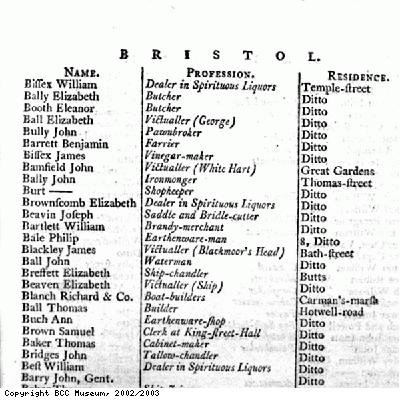
Description:
Extract from Matthews Bristol Directory, Elizabeth Blessett, ship-chandler
Creator: Elizabeth Blesset
Copyright: Copyright BCC Museum
Bristol Arms
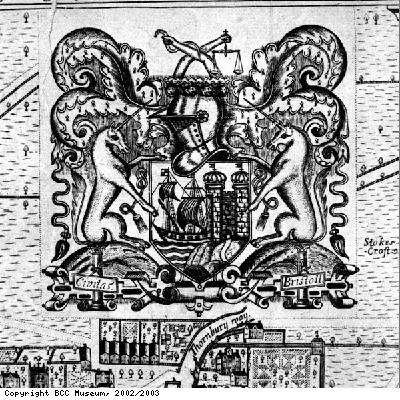
Description:
Arms of Bristol, from Millerd, 1673
Creator: James Millerd
Date: 1673
Copyright: Copyright BCC Museum
Directory Extract
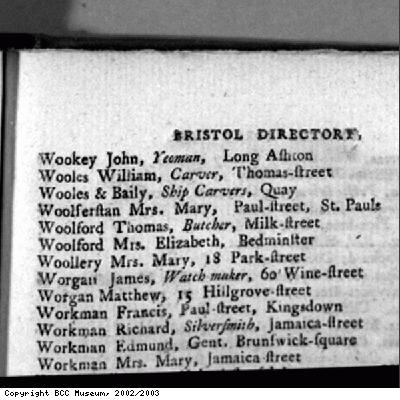
Description:
Extract from Matthew’s Bristol Directory extract, Wooles and Bailey, ship carvers.
Creator: William Matthews
Copyright: Copyright BCC Museum
Directory Extract
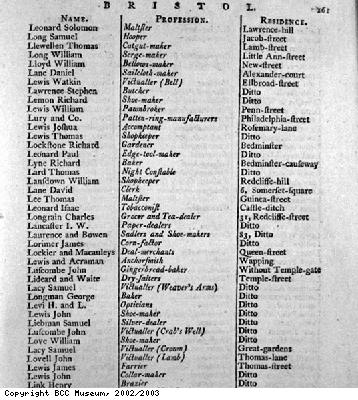
Description:
Extract from Matthew’s Bristol Directory, Daniel Lane, sailcloth maker, Isaac Leonard, tobacconist.
Creator: William Matthews
Copyright: Copyright BCC Museum
Great Crane on Princess Street
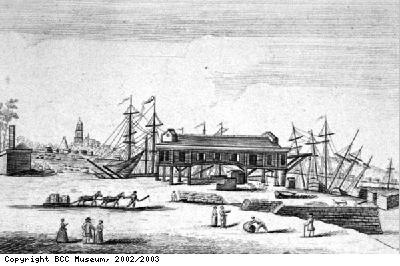
Description:
The Great Crane on Princess Street, detail, from Donne’s map
Creator: Donne
Copyright: Copyright BCC Museum
Medallion commemorating Abolition
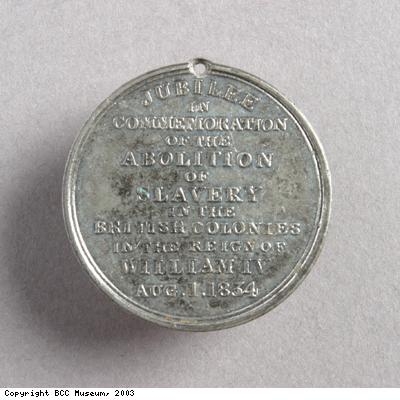
Description:
Medallion to commemorate the abolition of the slave trade.
Date: 1834
Copyright: Copyright BCC Museum
Object ID:0.4265
Medallion commemorating Abolition
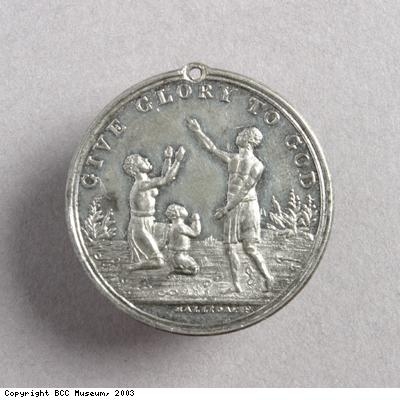
Description:
Medallion commemorating the abolition of the slave trade.
Date: 1834
Copyright: Copyright BCC Museum
Object ID:0.4265
Advert for Churchman’s patent chocolate
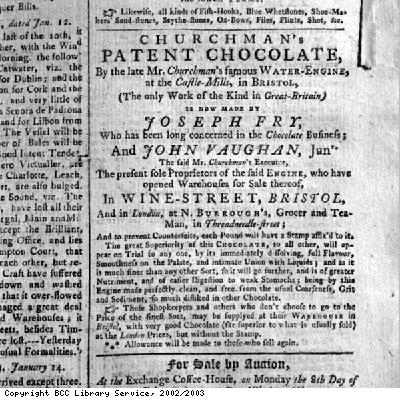
Description:
Advertisement for Churchman’s patent chocolate, now made by Joseph Fry and John Vaughan. Felix Farley’s Bristol Journal. Walter Churchman’s hydraulic grinding press replaced hand-grinding cocoa beans, speeding up the manufacturing process.
Cocoa, which was used to make chocolate, was grown on slave planations in the Caribbean and brought to Bristol for processing.
Chocolate was first used as a drink, sweetened with sugar to mask the bitter flavour of the chocolate. Later it was used for making eating chocolate. At this period, most people drank beer, wine or spirits. Water was not safe to drink, tea coffee and chocolate were expensive. Quakers promoted drinking chocolate as an alternative to alcohol.
Creator: Joseph Fry and John Vaughan
Date: unknown
Copyright: Copyright BCC Library Service
Chocolate Wrapper

Description:
Chocolate wrapper for Allopathic Chocolate, JS Fry and Sons.
Cocoa, which was used to make chocolate, was grown on slave planations in the Caribbean and brought to Bristol for processing.
Chocolate was first used as a drink, sweetened with sugar to mask the bitter flavour of the chocolate. Later it was used for making eating chocolate. At this period, most people drank beer, wine or spirits. Water was not safe to drink, tea coffee and chocolate were expensive. Quakers promoted drinking chocolate as an alternative to alcohol.
With thanks to Cabury/Schweppes for the use of this item.
Creator: JS Fry and Sons
Copyright: Copyright BCC Museum
Chocolate Wrapper

Description:
Chocolate wrapper, for Frys Chocolate Cream Batons.
Cocoa, which was used to make chocolate, was grown on slave planations in the Caribbean and brought to Bristol for processing.
Chocolate was first used as a drink, sweetened with sugar to mask the bitter flavour of the chocolate. Later it was used for making eating chocolate. At this period, most people drank beer, wine or spirits. Water was not safe to drink, tea coffee and chocolate were expensive. Quakers promoted drinking chocolate as an alternative to alcohol.
With thanks to Cabury/Schweppes for the use of this item.
Creator: JS Fry and Sons
Date: unknown
Copyright: Copyright BCC Museum
Page 305 of 352 pages « First < 303 304 305 306 307 > Last »

